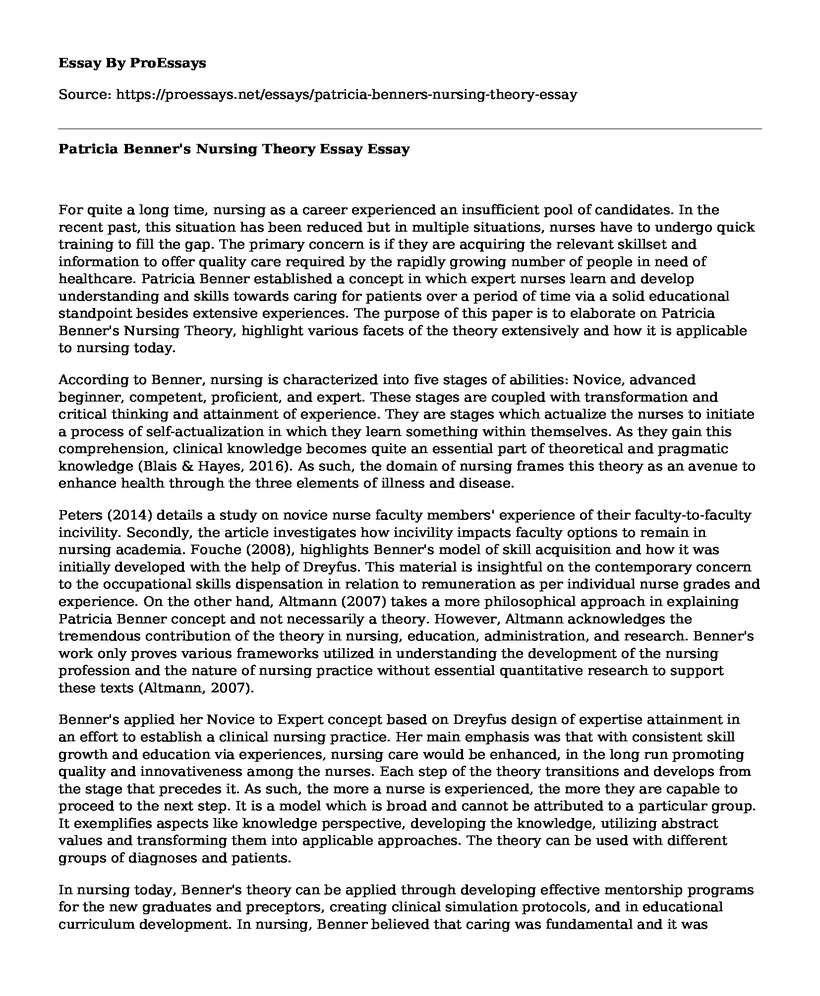For quite a long time, nursing as a career experienced an insufficient pool of candidates. In the recent past, this situation has been reduced but in multiple situations, nurses have to undergo quick training to fill the gap. The primary concern is if they are acquiring the relevant skillset and information to offer quality care required by the rapidly growing number of people in need of healthcare. Patricia Benner established a concept in which expert nurses learn and develop understanding and skills towards caring for patients over a period of time via a solid educational standpoint besides extensive experiences. The purpose of this paper is to elaborate on Patricia Benner's Nursing Theory, highlight various facets of the theory extensively and how it is applicable to nursing today.
According to Benner, nursing is characterized into five stages of abilities: Novice, advanced beginner, competent, proficient, and expert. These stages are coupled with transformation and critical thinking and attainment of experience. They are stages which actualize the nurses to initiate a process of self-actualization in which they learn something within themselves. As they gain this comprehension, clinical knowledge becomes quite an essential part of theoretical and pragmatic knowledge (Blais & Hayes, 2016). As such, the domain of nursing frames this theory as an avenue to enhance health through the three elements of illness and disease.
Peters (2014) details a study on novice nurse faculty members' experience of their faculty-to-faculty incivility. Secondly, the article investigates how incivility impacts faculty options to remain in nursing academia. Fouche (2008), highlights Benner's model of skill acquisition and how it was initially developed with the help of Dreyfus. This material is insightful on the contemporary concern to the occupational skills dispensation in relation to remuneration as per individual nurse grades and experience. On the other hand, Altmann (2007) takes a more philosophical approach in explaining Patricia Benner concept and not necessarily a theory. However, Altmann acknowledges the tremendous contribution of the theory in nursing, education, administration, and research. Benner's work only proves various frameworks utilized in understanding the development of the nursing profession and the nature of nursing practice without essential quantitative research to support these texts (Altmann, 2007).
Benner's applied her Novice to Expert concept based on Dreyfus design of expertise attainment in an effort to establish a clinical nursing practice. Her main emphasis was that with consistent skill growth and education via experiences, nursing care would be enhanced, in the long run promoting quality and innovativeness among the nurses. Each step of the theory transitions and develops from the stage that precedes it. As such, the more a nurse is experienced, the more they are capable to proceed to the next step. It is a model which is broad and cannot be attributed to a particular group. It exemplifies aspects like knowledge perspective, developing the knowledge, utilizing abstract values and transforming them into applicable approaches. The theory can be used with different groups of diagnoses and patients.
In nursing today, Benner's theory can be applied through developing effective mentorship programs for the new graduates and preceptors, creating clinical simulation protocols, and in educational curriculum development. In nursing, Benner believed that caring was fundamental and it was directed by ethical standards and individual responsibilities of nurses. The theory helps in gathering a team of experts who can work in a challenging environment to build a quality care plan for patients.
Conclusion
Benner's theory offers concepts through which nurses can refer to in their daily interactions with each other through knowledge acquisition and experience to provide quality healthcare. This paper has highlighted the theory in details with a particular focus on its definition in relation to how it is framed in the nursing domain as well as its relevance today. The theory is used to advance knowledge in schools, to teach nursing, simulation, and informatics among others.
References
Altmann, T. (2007). An evaluation of the seminal work of Patricia Benner: Theory or philosophy?. Contemporary Nurse, 25(1-2), 114-123. doi: 10.5172/conu.2007.25.1-2.114
Blais, K., & Hayes, J. S. (2016). Knowledge development in nursing. In Professional nursing practice: Concept and perspectives (7th ed.) Boston: Pearson.
Fouche, N. (2008). Benner is back. Journal of Critical Care, 24(2), 167-171. doi: doi:10.7196/SAJCC.63
Peters, A. (2014). Faculty to faculty incivility: Experiences of novice nurse faculty in academia. Journal of Professional Nursing, 30(3), 213-227. doi: 10.1016/j.profnurs.2013.09.007
Cite this page
Patricia Benner's Nursing Theory Essay. (2022, Jul 13). Retrieved from https://proessays.net/essays/patricia-benners-nursing-theory-essay
If you are the original author of this essay and no longer wish to have it published on the ProEssays website, please click below to request its removal:
- Critical Reflective Analysis of a Counsellor
- Fall Reduction With Multifactorial and Nursing Intervention Essay
- Nutritional Requirements During Pregnancy: Understanding Health Risks - Essay Sample
- Essay Example on Anemia: Types & Causes: Microcytic, Normocytic & Macrocytic
- Essay Example on 3 Types of Hospitals: Gov't, Non-Profit, For-Profit
- Downside Risks, Security Concerns and Nigeria's Economic Outlook - Essay Sample
- Essay Example on Shift Changes: Impact on Nursing Teams & Patient Safety







